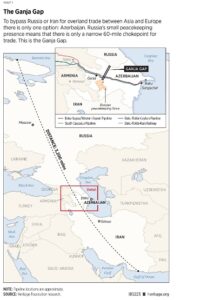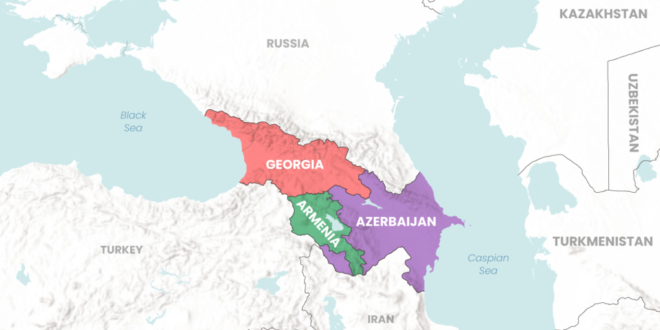The Heritage Foundation dangerous twist to circumvent Iran, Russia / US must intervene in South Caucasus.
The views and opinions expressed are those of the authors and do not necessarily reflect the official policy or position of us.
According to Mouood, quotes by The Heritage Foundation:
One Year After the Second Karabakh War, the U.S. Needs to Increase Engagement in the South Caucasus
This week marks the one-year anniversary of the beginning of the Second Karabakh War between Azerbaijan and Armenia. By early November 2020, the war was over, with Armenia and Armenian-backed separatists defeated by a better-trained and better-equipped Azerbaijani military. Azerbaijan was able to restore its internationally recognized borders and end a nearly three-decade Armenian occupation. Russia brokered a cease-fire agreement on November 9. As part of the deal, Russia established a small peacekeeping force in the ethnically Armenian populated region of Nagorno–Karabakh.
One year since the start of the war, it is now clear that Azerbaijan’s victory has created a new geopolitical reality in the South Caucasus and the Caspian region of which U.S. policymakers need to be aware. Azerbaijan is located in a strategic region where many U.S. geopolitical interests converge. If the U.S. was serious about great-power competition, it would improve relations with Baku by increasing the number of senior visits to Azerbaijan; increasing America’s diplomatic presence in the country; working with Azerbaijan to improve the energy security of the transatlantic community; and supporting regional trade, economic, and energy projects that include both Armenia and Azerbaijan.
Five Issues for U.S. National Interest
Azerbaijan is an important, if often-overlooked, country concerning many of the challenges the U.S. faces around the world. There are five issues that American policymakers should consider when developing the U.S. approach to Azerbaijan:
- Energy security for the transatlantic community. The transatlantic community benefits whenever Europe reduces its dependence on Russian oil and gas. Azerbaijan offers an important alternative to Russia. The Southern Gas Corridor is a great example of this. If the proposed Trans-Caspian Gas Pipeline were ever realized, Azerbaijan would play an even bigger role in Europe’s energy diversification away from Russia.1
- Geostrategic location in the context of great-power competition. At one point on the vast Eurasian landmass, all trade and transit has to pass through one of three countries: Russia, Azerbaijan, or Iran. The breakdown in relations between the West and Moscow and Tehran means that Russia and Iran are not viable options for the free east–west flow of trade and energy. This trade chokepoint is the Ganja Gap—named after Azerbaijan’s second largest city, Ganja, which sits in the middle of this narrow passage. Keeping access to the Ganja Gap is important to any U.S. strategy in the region.
- Relations with Israel. Azerbaijan has also proved to be a reliable U.S. partner regarding another sensitive geopolitical issue: Israel. Although Azerbaijan is a Muslim-majority country, it is a secular society and has a very close relationship with Israel. The Azerbaijani city of Qirmizi Qasaba is thought to be the world’s only all-Jewish city in the world outside Israel. Azerbaijan also provides Israel with 40 percent of its oil.2
- An important diplomatic interlocutor. Baku often hosts high-level and sensitive diplomatic meetings. Azerbaijan has hosted a number of high-level meetings between U.S. and Russian military leaders in recent years. Such meetings are especially useful given the frosty state of U.S.–Russian relations. They present a non-political opportunity for the United States to discuss, on a military-to-military level, issues such as how to prevent military accidents in Syria.
- The key to Central Asia. For economic, cultural, trade, historical, and transit reasons Azerbaijan, while not a Central Asian country, is the gateway to the region for the transatlantic community. This is particularly true considering the importance of the Ganja Gap. Baku also maintains close relations with many of the Central Asian republics, especially Kazakhstan and Turkmenistan—both of which could be very important to Europe’s energy needs.

New Geopolitical Reality
Azerbaijan’s victory in the Second Karabakh War has created a new geopolitical reality in the South Caucasus and the Caspian region. The victory also demonstrated that the “old way” of viewing the region no longer applies. The sooner that U.S. policymakers recognize and understand these new realities, the better for U.S. interests. This new geopolitical reality creates fresh opportunities for the United States:
- Iran is weaker in the region. Tehran has a new geopolitical reality on its northern border in the form of an emboldened Azerbaijan and a weakened Armenia. The latter has enjoyed cozy relations with Tehran over the years. Relations between Iran and Azerbaijan are cordial, but there are tensions beneath the surface.
- While cordial on the surface, relations between Moscow and Baku are strained. Azerbaijan has pursued a pragmatic foreign policy when dealing with Russia, one that balances Baku’s desire for independence from Moscow-backed organizations while maintaining cordial relations with Moscow. However, the past year has strained Azerbaijan’s relations with Russia.3
- An Azerbaijan-brokered Turkish–Israeli rapprochement is a possibility. Israel and Azerbaijan have a strategic relationship. Turkey and Azerbaijan have an even closer relationship built on the mantra of “one nation with two states.” In the past year, there has been talk of Azerbaijani President Ilham Aliyev working behind the scenes to get the strained Turkish–Israeli relationship back on track.4
This would benefit U.S. interests in the Middle East and beyond.
- New regional energy, trade, and economic projects are now possible. Now that the Armenian occupation has ended, there are new opportunities for regional economic and trade cooperation. The U.S. should focus on increasing foreign investment, improving the economic situation by promoting economic freedom, and expanding trade connectivity in the South Caucasus.
Recommendations for the United States
The geopolitical situation offers an opportunity for the U.S. to strengthen its relationship with Azerbaijan. The signals coming from the South Caucasus region could not be clearer. As relations between Baku and Moscow remain frosty, the U.S. must act. The U.S. should pursue a pragmatic relationship with Azerbaijan based on strategic and regional mutual interests. The U.S. should:
- Plan a presidential visit to the South Caucasus. No sitting U.S. President has visited Azerbaijan or Armenia and only one, George W. Bush, has visited Georgia. It is time for this to change. A visit by the U.S. President would be a strong message of the importance of the region to the United States.
- Show a more visible U.S. presence in Azerbaijan. Although then-National Security Advisor John Bolton visited Baku in 2018, the most recent Cabinet-level visit to Azerbaijan was then-Secretary of State Hillary Clinton’s South Caucasus tour in 2012. A good way to start re-engagement easily and symbolically would be with a few high-level visits by U.S. officials.
- Turn the C5+1 into the C5+2 by including Azerbaijan. For the U.S. to engage successfully with Central Asia, it must include Azerbaijan. The C5+15 is a U.S.-led initiative created in 2007. The primary goal is to create a multilateral format for the five Central Asian republics and the U.S. to build relations. For economic, cultural, trade, historical, and transit reasons Azerbaijan, while not a Central Asian country, is the gateway to the region for the transatlantic community. This is particularly true considering the importance of the Ganja Gap. Azerbaijan must have a seat at the table.
- Establish a diplomatic presence in Ganja. A U.S. diplomatic presence, whether in the form of a consulate or consular agency, would be valuable. Not only is Ganja strategically located on the Eurasian landmass, it is also Azerbaijan’s second-largest city. A U.S. consulate would demonstrate that the U.S. takes the region at a level of seriousness proportionate to its role in America’s global interest. In addition, a diplomatic presence would give the U.S. government a depth of situational awareness in the region not possible without a consulate.
- Offer political support for the construction of the Trans-Caspian Gas Pipeline. With the completion of the Nord Stream 2 gas pipeline, Europe needs alternatives to Russian gas more than ever. The Trans-Caspian Gas Pipeline could play an important role.
- Offer political support for the construction of new regional transit and energy infrastructure that includes Armenia. Now is the time to build an enduring peace between Armenia and Azerbaijan. In the past, Armenians and Azerbaijanis traded with each other and lived peacefully. There is no telling how many billions of dollars in foreign direct investment have been denied to the South Caucasus because of the frozen conflict in Nagorno–Karabakh. An enduring peace between the Armenia and Azerbaijan can benefit the entire South Caucasus.
- Applaud Azerbaijan privately for staying away from Russian-dominated organizations. Russia’s Eurasian Economic Union and the Collective Security Treaty Organization are retrograde structures that serve only the interests of Russia at the expense of the other member states. The U.S. should privately encourage countries in the region to maintain cordial, but not subservient, relations with Russia and applaud those who refrain from joining Russian-dominated organizations.
- Provide military and security assistance to all deserving allies in the region. The U.S. government’s decision to provide military assistance to another country should be based on American security interests, not on certain pressure groups lobbying Congress. Section 9076 of the Freedom Support Act is an unfair impediment to acting in the interest of U.S. security.
Conclusion
Azerbaijan will continue to be a regional economic leader in the South Caucasus, and an important economic actor in the Caspian region. If the U.S. pursues correct policies, Azerbaijan could also serve as an important alternative source of energy for Europe well into the future. Today, the U.S. sees an Azerbaijan that is more cautious and mindful of its place in the region. Globally, Azerbaijan is trying to maintain a balance between its relations with the West and Russia. Regionally, Azerbaijan has sought to keep a balance between Russia and Iran while striving to preserve its autonomy or independence as much as possible. With great-power competition heating up around the globe, the U.S. needs to increase its engagement with Azerbaijan.
P.S.:
1-Luke Coffey, “Oil and Gas Exports from Central Asia Should Bypass Russia and Iran—What the U.S. Can Do,” Heritage Foundation Issue Brief No. 5048, March 23, 2020, https://www.heritage.org/global-politics/report/oil-and-gas-exports-central-asia-should-bypass-russia-and-iran-what-the-us.
2-Tovah Lazaroff, “Azerbaijani Ambassador: Border Hostilities May Harm Israeli Oil Supplies,” The Jerusalem Post, July 21, 2020, https://www.jpost.com/israel-news/azerbaijani-ambassador-border-hostilities-may-harm-israeli-oil-supplies-635851 (accessed September 23, 2021).
3-Vasif Huseynov, “Azerbaijan Increasingly Critical of Russia’s Peacekeeping Mission in Karabakh,” Eurasia Daily Monitor, Vol. 18, No. 144 (September 2021), https://jamestown.org/program/azerbaijan-increasingly-critical-of-russias-peacekeeping-mission-in-karabakh/ (accessed September 24, 2021).
4-Barak Ravid, “Scoop: Azerbaijan Seeks to Mediate Between Turkey and Israel,” Axios, December 23, 2020, https://www.axios.com/azerbaijan-mediate-between-israel-turkey-erdogan-bb604eac-31d7-4dcf-b8a7-af6157328a50.html (accessed September 24, 2021).
5-The C5 countries are Kazakhstan, the Kyrgyz Republic, Tajikistan, Turkmenistan, and Uzbekistan. The +1 is the United States.
6-In 1992, Congress passed Section 907 of the Freedom Support Act due to the influential Armenian lobby. In sum, Section 907 prevents the U.S. from providing military aid to Azerbaijan. Azerbaijan is the only former Soviet republic that has restrictions, such as Section 907, placed on it. After 9/11, the Bush Administration recognized the important role that Azerbaijan would play in the campaign in Afghanistan (and later Iraq) and annually waived Article 907. The Obama, Trump, and Biden Administrations continued to waive Section 907.
 Mouood Mouood English Edition
Mouood Mouood English Edition




